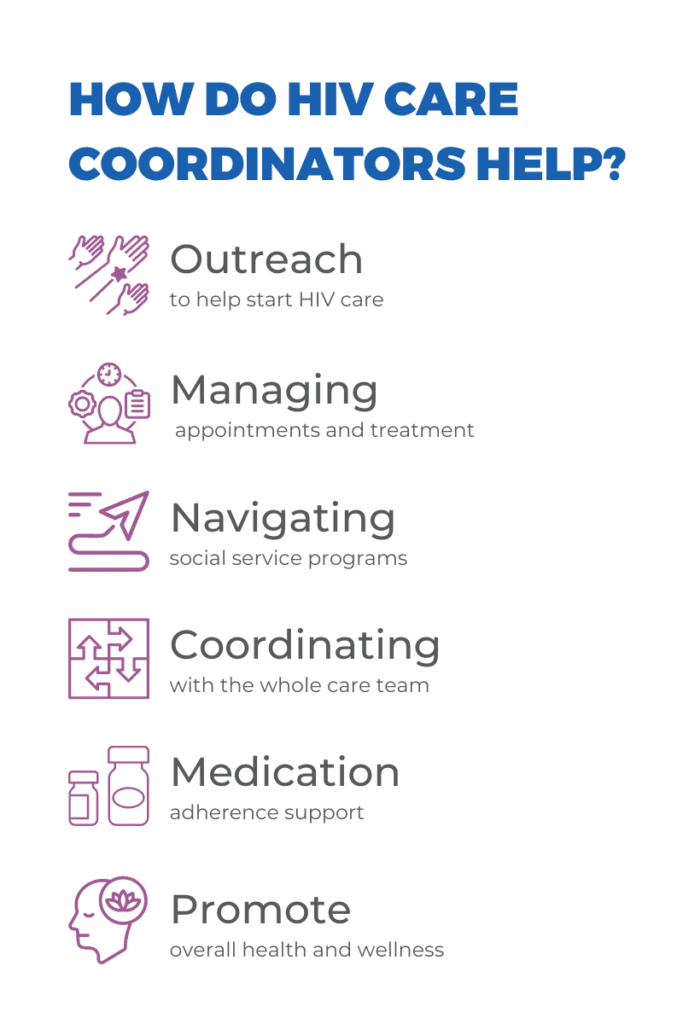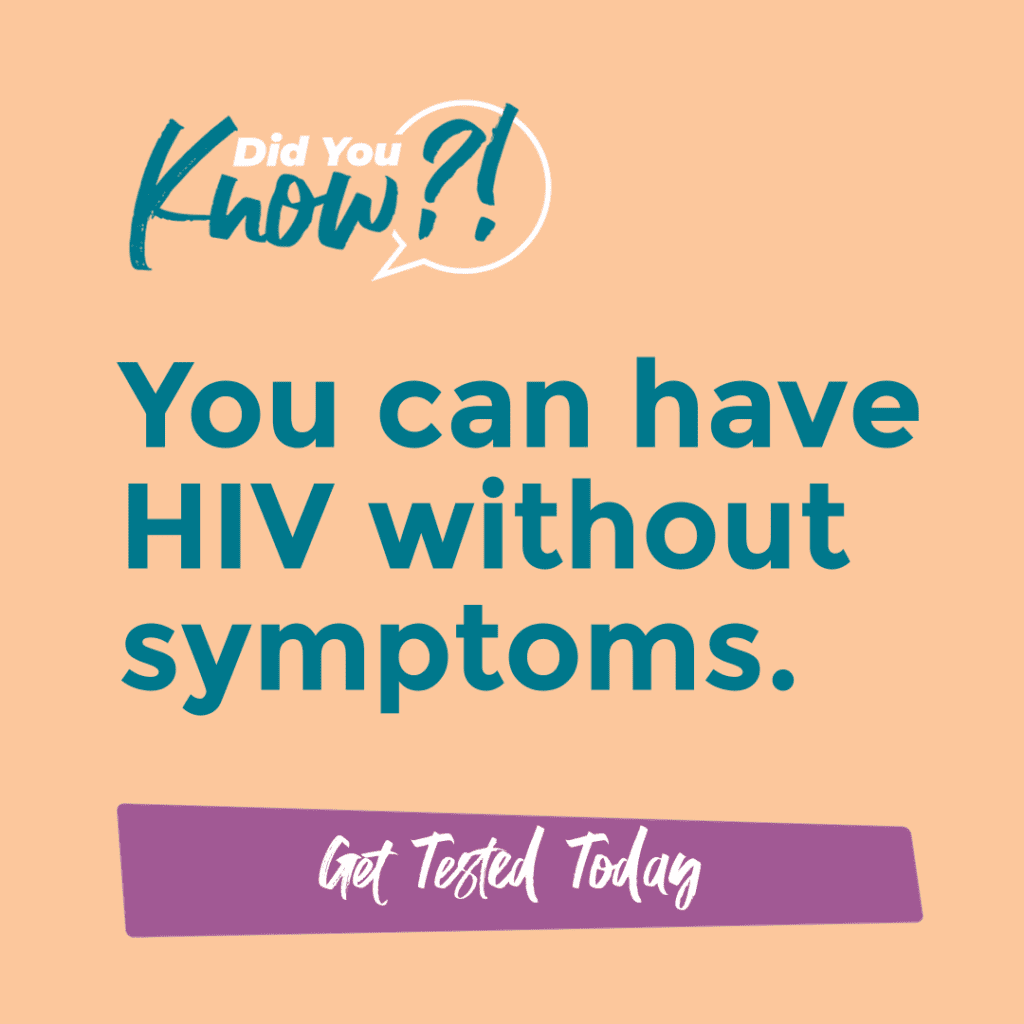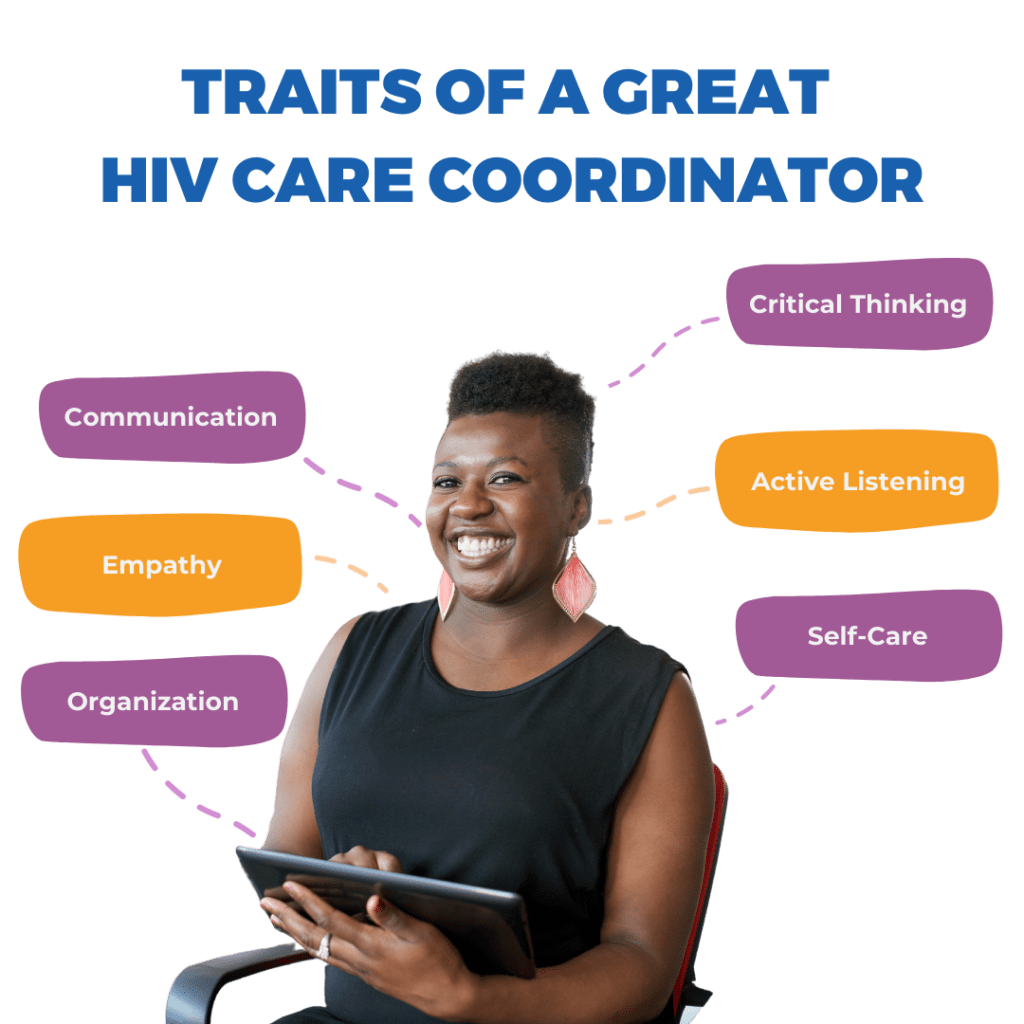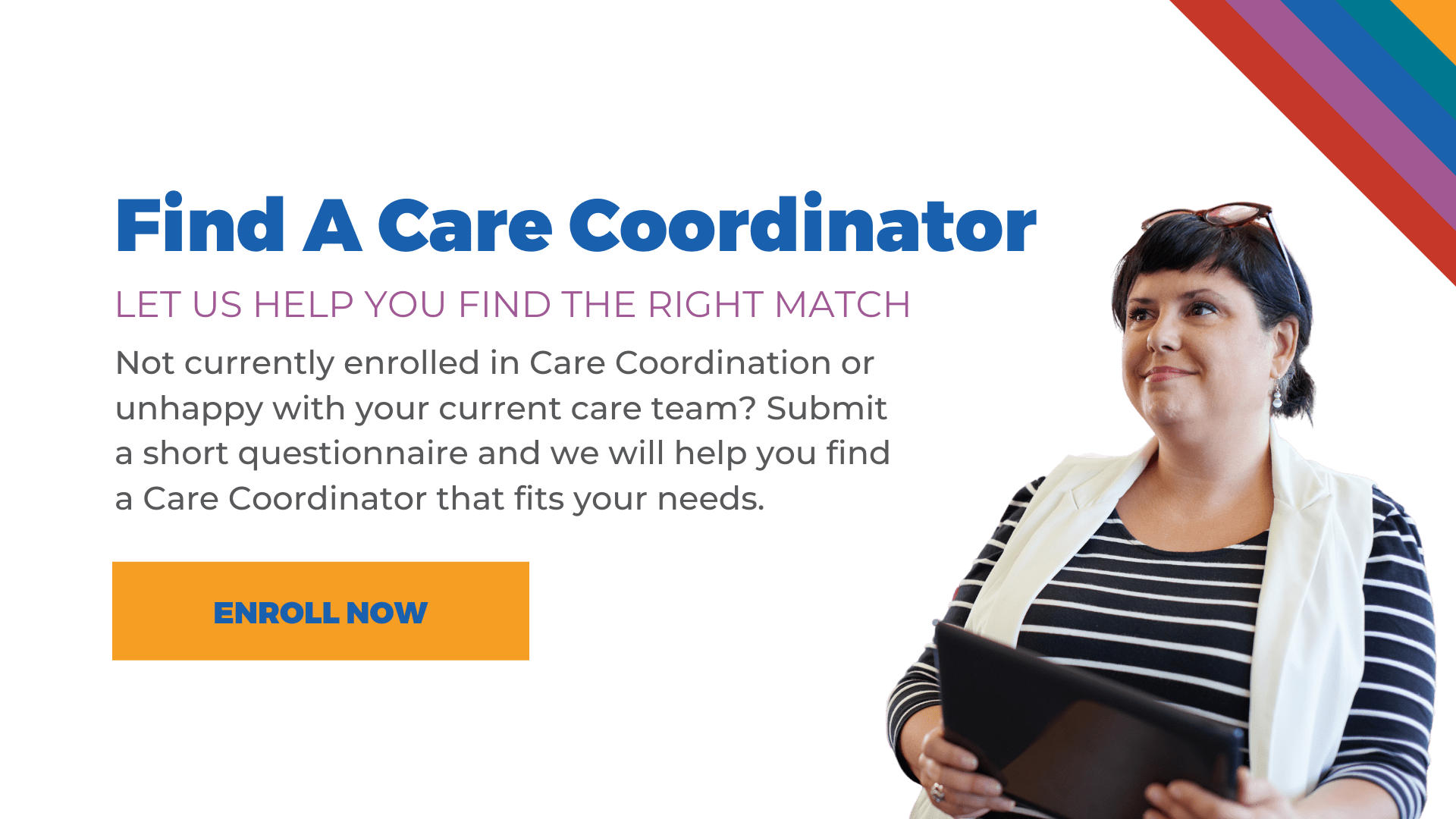What is Care Coordination?
Care coordination is organizing care and services among different healthcare providers. HIV Care Coordination aims to improve health outcomes for people living with HIV by improving communication and coordination among various providers involved in their care.
In addition to taking medication, people living with HIV may also need to see a primary care provider, an HIV specialist, and other specialists for mental health or substance use.
Each of these providers has different office hours, uses different electronic medical records systems, and may be located in different parts of town. This can make it challenging to keep track of appointments, fill prescriptions, and stay on top of care.
HIV care coordinators help by serving as the primary point of contact for all your healthcare needs. Their role is to help you design a personalized care plan and determine which issues are most important. They can also assist you in locating resources to meet your needs and help you access those resources. Once you work together to set your goals, they will monitor your progress and keep you on track.HIV care coordinators can be helpful if you:
- Are newly diagnosed with HIV and are trying to navigate the healthcare system
- Have many different healthcare providers
- Often miss appointments or have trouble taking your HIV medication as prescribed
- Haven’t been in care for a long time and are trying to re-engage in care
- Have other health conditions besides HIV
- Are struggling to stay in care
- Are not currently in care but are interested in getting started
How Care Coordinators Help
 Care coordinators aim to improve health outcomes among people living with AIDS. Here are six ways care coordinators help those affected by HIV:
Care coordinators aim to improve health outcomes among people living with AIDS. Here are six ways care coordinators help those affected by HIV:
-
Outreach to help people start HIV care: A care coordinator’s goal is to ensure that everyone who needs care receives care. They work tirelessly to connect individuals living with HIV to the care and resources they need.
-
Navigating social service programs: Care coordinators understand the complex web of social service programs available to people living with HIV. They can help you navigate these programs and connect you with the resources you need.
-
Coordinating with the whole healthcare team: Care coordinators act as a liaison between you and your entire healthcare team. They make sure every team member is on the same page, working together to deliver the best possible care.
-
Care navigation: Care coordinators will guide you through the healthcare system’s complexities. They can help you schedule appointments, find transportation, and provide support at primary care appointments.
-
Treatment/medication adherence support: One of the essential roles of a care coordinator is to help you adhere to your treatment and medication regimen. They understand that taking medication can be difficult, and they will work with you to create a plan that works for you.
-
Promote overall health: Care coordinators understand that HIV affects more than your physical health. They will work with you to promote overall health and positive well-being.
If you live with HIV, a care coordinator can be a helpful asset. They can help you navigate the complex world of healthcare and connect you with the resources you need to stay healthy.
They care for all the little things so you can concentrate on what’s important – living your life.What Tasks Does a Care Coordinator Handle?
A care coordinator takes on many different roles depending on their patients’ needs. Here are some practical examples of tasks a care coordinator handles:
HIV Care and Treatment
One essential role of a care coordinator is helping people with HIV manage their care and treatment. This can involve everything from scheduling appointments with doctors to enrolling in copay assistance programs and improving medication adherence. Care coordinators know how to help patients understand their lab reports and the care they are receiving.
Health Insurance
Another crucial role of care coordinators is helping people find and enroll in affordable health insurance. It can be confusing and taxing for many people, but care coordinators can help make it much more manageable. They can also help people navigate bills from health providers.
Social Service Referrals
Care coordinators can also help people connect with the social services they may need, such as food or employment assistance. This can involve everything from nutrition counseling and education to job skills training and employment navigation. For those in need of emergency financial assistance, care coordinators can find ways to help with rent or mortgage payments and utility payments.
They’ll even help you get government benefits like disability or Medicare if you qualify.
So if you or someone you know needs some extra help navigating the healthcare system, don’t hesitate to reach out to a care coordinator. They’re there to help you with every step, and they can make a big difference in your overall experience.How to Enroll in Care Coordination
Getting started with care coordination is easy. Contact your local health department or community health center and ask for assistance finding a care coordinator.
Once you’ve been assessed by a care coordinator and determined to be eligible for services, they will help you develop an Individualized Care Plan (ICP). This ICP is specifically designed for you and your needs, outlining all available resources.
The care coordinator will also help you enroll in any support services you may need. After everything is set up, the care coordinator will follow up with you periodically to ensure everything is going smoothly and see if any adjustments need to be made to your care plan.
Since they are such a vital part of the healthcare team, choosing a care coordinator you trust and who makes you feel comfortable is essential. Be sure to ask plenty of questions during your initial assessment to understand whether or not the care coordinator is a good fit for you.
Here are some traits to look for when choosing a care coordinator:
 Empathy: A good care coordinator will be able to understand your point of view and what you are going through. They should be able to offer guidance tailored to your unique situation.
Empathy: A good care coordinator will be able to understand your point of view and what you are going through. They should be able to offer guidance tailored to your unique situation.
Communication: You must be able to communicate clearly with your care coordinator. This will ensure your care plan effectively gets you the help you need.
Organization: A good care coordinator will have a well-organized care plan tailored to your individual needs. They should be able to prioritize your care and ensure that all your needs are being addressed.
Critical thinking: A good care coordinator will be able to think critically about your situation and provide the proper support. They should be able to comprehend your needs and offer advice in your best interests.
Active listening: A good care coordinator will actively listen to you and make sure that they understand what you are saying. They should be able to offer support based on what you’ve told them.
Self-care: A good care coordinator sets professional boundaries that allow them to care for themselves and care for you. This helps ensure they can effectively support you over the long-term.
These are some markers to look out for in a care coordinator. When choosing a care coordinator, ask about their qualifications and experience to ensure they are the right fit for you and your needs.
If your current care coordinator isn’t meeting your needs, you might consider finding a new one. You can speak to your doctor or another healthcare provider about finding a new care coordinator that is right for you.
Not currently enrolled in Care Coordination? Get started today to see if there are any issues that a care coordinator can help solve. After all, it’s free, so what do you have to lose?
We have a team prepared to help you find the proper care coordinator for your needs, wherever you are in your journey. Reach out to us today to get set up with an HIV care coordinator in your area.





